Related Research Articles

The British & Irish Lions is a rugby union team selected from players eligible for the national teams of England, Ireland, Scotland, and Wales. The Lions are a test side and most often select players who have already played for their national team, although they can pick uncapped players who are eligible for any of the four unions. The team tours every four years, with these rotating between Australia, New Zealand and South Africa in order. The most recent test series, the 2021 series against South Africa, was won 2–1 by South Africa.
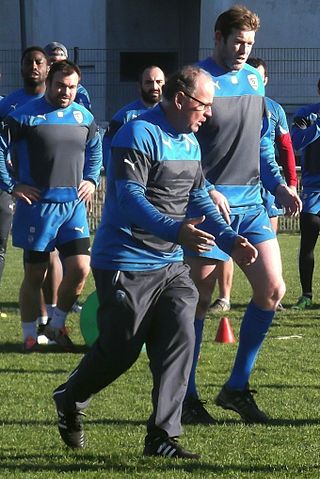
Jake White is a professional rugby union coach and former coach of the South African national team – the Springboks – whom he coached to victory in 2007 Rugby World Cup and the 2004 Tri Nations. White also coached the Under-21 Springbok side to victory in the Under-21 World Cup in 2002. He was coach of the Brumbies in the Super Rugby from 2012, but resigned with two years remaining on his contract in 2013 to return to South Africa. On returning to South Africa, he coached the Sharks for a single season, explaining he wanted to seek international opportunities. This arose in a technical role with the Tongan national team. After assisting Tonga in their 3 Test European Tour in 2014, White was announced as Montpellier's new boss, overseeing all coaching aspects for the club.
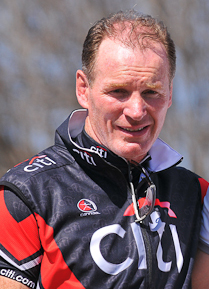
Simon Paul Poidevin is a former Australian rugby union player. Poidevin made his Test debut for Australia against Fiji during the 1980 tour of Fiji. He was a member of the Wallabies side that defeated New Zealand 2–1 in the 1980 Bledisloe Cup series. He toured with the Eighth Wallabies for the 1984 Australia rugby union tour of Britain and Ireland that won rugby union's "grand slam", the first Australian side to defeat all four home nations, England, Ireland, Wales and Scotland, on a tour. He debuted as captain of the Wallabies in a two-Test series against Argentina in 1986, substituting for the absent Andrew Slack. He was a member of the Wallabies on the 1986 Australia rugby union tour of New Zealand that beat the All Blacks, one of six international teams and second Australian team to win a Test series in New Zealand. During the 1987 Rugby World Cup, he overtook Peter Johnson as Australia's most capped Test player against Japan, captaining the Wallabies for the third time in his 43rd cap. He captained the Wallabies on a fourth and final occasion on the 1987 Australia rugby union tour of Argentina before injury ended his tour prematurely. In 1988, he briefly retired from international rugby, reversing his decision 42 days later ahead of the 1988 Bledisloe Cup series. Following this series, Poidevin returned to the Australian side for the single 1989 Bledisloe Cup Test. He returned full-time to the Australian national squad for the 1991 season. Poidevin was a member of the Wallabies that won the 1991 Rugby World Cup, after which he retired from international rugby union.
A World XV is a rugby union team organised on an unofficial, ad hoc basis and typically composed of invited players from various countries. Several World XVs have been arranged by various bodies since the 1970s, often to take part in celebration and testimonial games, usually against national teams, but these are not considered test matches by most nations.
David Steven Loveridge is an All Black of the late 1970s and early 1980s, known in his time as the greatest halfback in the world.

The Manawatu Rugby Football Union (MRU) serves as the governing body of the sport of rugby union in the Manawatū-Whanganui region of New Zealand.
Mark Richard Allen, commonly known as Bull Allen, is a New Zealand former rugby union footballer and TV celebrity, reaching iconic status on the New Zealand sports scene in the 1990s. As well as 19 games and 8 test match appearances for New Zealand, Allen played 110 games for Taranaki and was captain of the inaugural Wellington Hurricanes Super 12 team. He was also captain of the first and short-lived Central Vikings team.
The Cavaliers was an unofficial New Zealand rugby union team which toured South Africa in 1986. Because of the Apartheid policies of the South African government, the official New Zealand Rugby Union tour scheduled for 1985 was cancelled, and the Cavaliers tour was very controversial in New Zealand.
The French national rugby union team first competed at the 1900 Summer Olympics.
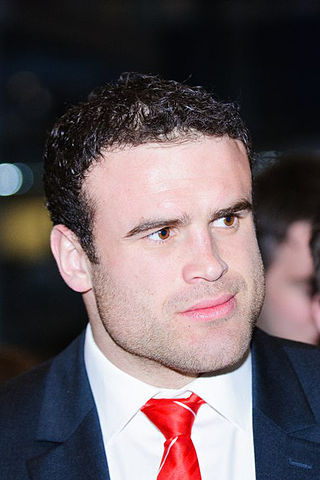
Jamie Huw Roberts is a Welsh former professional rugby union player, who played as a centre.
Lee Stensness is a former New Zealand rugby union footballer who played for Manawatu, Auckland, the Blues and the All Blacks. He made his debut for the All Blacks in 1993.

Israel Jamahl Akuhata Dagg is a former New Zealand rugby union player who played for the Crusaders in Super Rugby. He has also played for the New Zealand Sevens team, and represents Hawkes Bay in the ITM Cup.
The 1980 New Zealand tour of Wales was a collection of friendly rugby union games undertaken by the New Zealand All Blacks against Wales that also took in two international games in North America en route to South Wales. This was a single test tour against each of the countries played, with four games against Welsh club opposition.
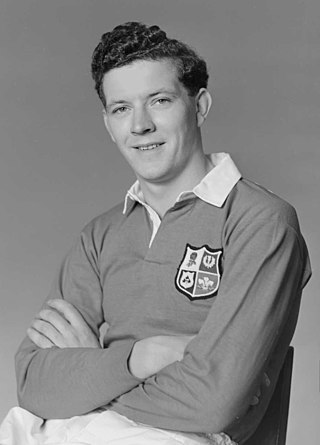
Ernest Raymond "Roy" John was a Wales and British Lions international rugby union lock. He played club rugby for Crynant and Neath. John was capped 19 times for Wales and was a member of two Grand Slam winning teams. In 1950 he was selected for the 1950 British Lions tour to New Zealand and Australia. John was an agile runner for a lock, but was most notable for his excellent ability in line-outs.

Aaron Wiremu Cruden is a New Zealand rugby union player, who plays for Waikato and formerly Montpellier, Manawatu and New Zealand internationally. Cruden's usual position is fly-half.
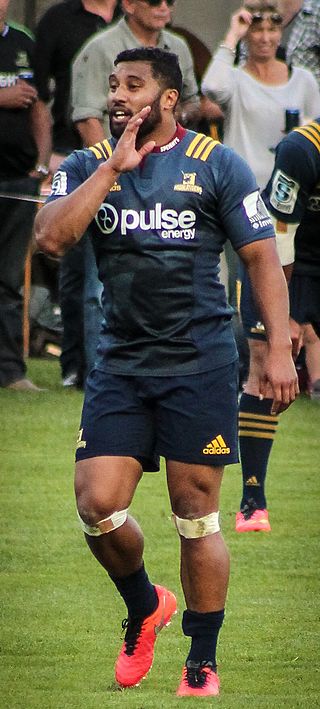
Lima Zachariah Sopoaga is a professional rugby union player who plays as a fly-half for Japan Rugby League One club Shimizu Blue Sharks. Born in New Zealand, he represents Samoa at international level after qualifying on ancestry grounds.

Ryan Stevenson Crotty is a New Zealand-born rugby union Rugby player. He currently plays as a midfield back for the Kubota Spears in the Japanese Top League.

Peter George Johnson was an Australian international rugby union player. He enjoyed a long state and international career throughout the 1960s and made 92 national appearances for his country. He captained the Australian side in five Test matches.
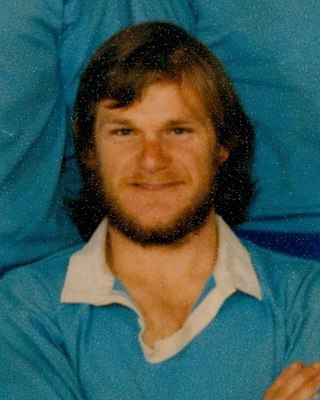
Douglas Leslie Rollerson was a New Zealand rugby union and rugby league player, and rugby union executive.
The History of the South Africa national rugby union team dates back to 1891, when the British Lions first toured South Africa where they played against South African representative sides. The South Africa national rugby union team played few international matches during a period of international sanctions due to apartheid. Since the end of apartheid in 1994, South Africa has once again fully participated in international rugby.